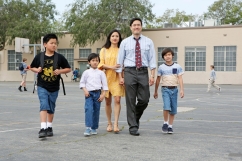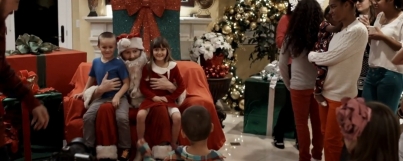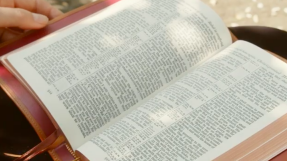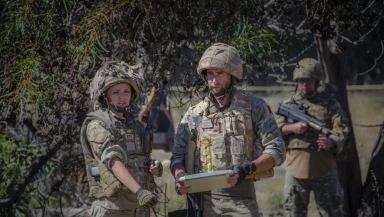
So, how can an evangelical Christian – who even has a degree in theology – write comedy which is rude, sometimes to the point of obscenity, has what the programmers like to call 'sex references', and whose only overtly Christian character ends up in a passionate clinch with someone with whom she most definitely shouldn't?
James Cary should know. He's written for hit TV comedies Miranda, My Family and My Hero, and Another Case of Milton Jones for radio. His Bluestone 42 sitcom, co-written with Richard Hurst, is another hit, and arguably displays his talent to its greatest extent yet.
Set in Afghanistan, it's the story of an assorted bunch of misfits in an army bomb disposal squad, and it's really funny. It's also as true to life as a sitcom about real soldiers in a real war zone could be – Cary and Hurst had serving and former military personnel as advisers to make sure they got the situations and the tone of the writing just right – and consequently the humour is sometimes pitch black and the language is not what you'd hear in the average church. It's very much what you'd hear in the average army unit, though, and for Cary, that's the point. Speaking at a Spring Harvest seminar in Minehead, he said: "Comedy is about truth, that's why some people don't like it. If something is offensive, it might have the ring of truth about it.
"If I want to be a good writer, I have to say, this is how soldiers speak. If I change that, it starts to feel fake. To make that world look sanitised is incredibly offensive, to them and to their families."
Furthermore, he says: "If something feels fake, it stops being funny and is just bad."
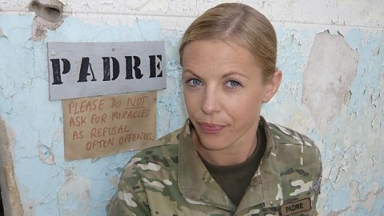
As well as its cast of oddball and often foul-mouthed soldiers, Bluestone 42 features an attractive female chaplain, Mary, whose pursuit by the dashing Captain Nick Medhurst is a theme of one of the series. It ends badly for her, with a sexual liaison she instantly regrets. To a questioner who says she's disappointed by the scene, Cary says he was disappointed too. There's the sense that he might not have written the scene like this if he weren't collaborating with a non-Christian, but also the sense that he's disappointed in her as a character.
"I think Mary is a liberal Anglican, and I don't think she feels as strongly about this as I do," he says. "She's made a very bad decision to be drawn to someone who's very bad news.
"The only thing I said [to Hurst, his co-writer] is that there was no way this character is going to lose her faith. I was never going to do a story in which the chaplain loses her faith – that was my line in the sand."
However, he says: "I was keen to show that having sex is a big deal. In the next episode, it's seen she is not OK with that. She ends up blaming herself for what happened. As a comedy writer, if an unfortunate event has happened, I'd like to see the consequences of that. And it affects him, he's a different person too."
Including Mary's character was a deliberate decision. "The population in general feel that vicars are weird and that they have to be on their best behaviour. But the army likes padres: they go around with sweets, they put films on. And if you've seen bad things you don't go to the psychologist [because the visit is recorded], you go to the padre. In general, the armed forces are very respectful."
Mary, he says, is "the most normal person there, shocked but trying not to be. She is almost normal. Also, she tries not to swear, she tries to be good."

Bluestone 42 is massively popular, like much of his other work. But Cary has thought about his trade, and he has a rationale for what he does.
"I believe that the universe is a comic place, a happy place, an absurd place," he says. "I want to celebrate that. As Christians we are a miserable group of people. I know comics who do Christian gigs, but they don't enjoy it, because they know everything they say is being filtered before people laugh at it.
"But I love comedy, I want to celebrate comedy, because that's the way the universe is."
Sitcoms, he says, are "profoundly Christian" in their very nature. "The story structure is compressed reality; everything has a meaning to it. There's no nihilism in a sitcom. There's an arc of truth: God humbles the proud and exposes the liars."
He instances a story from Bluestone 42: Captain Medhurst is so tired of army rations that he goes hunting and shoots an animal from an endangered species. Some of it he gives to Mary and his colonel eats the rest, leaving him with nothing to show for his efforts. "In sitcoms everyone gets what they deserve," Cary says. "They are profoundly Christian and profoundly moral."
It's a serious business, comedy. Should Christians be a little less quick to judge when they see something they don't like? Not necessarily.
"It's not a sin to be offended, but it's not your right not to be offended," Cary says. "Just because something makes you feel bad, it doesn't mean your human rights have been infringed.
"If you're offended by bad language in Bluestone 42 – good. If it makes you want to use bad language, don't watch it."
But that's how real soldiers in real war zones really talk. Shouldn't Christians of all people be able to hear the truth?













